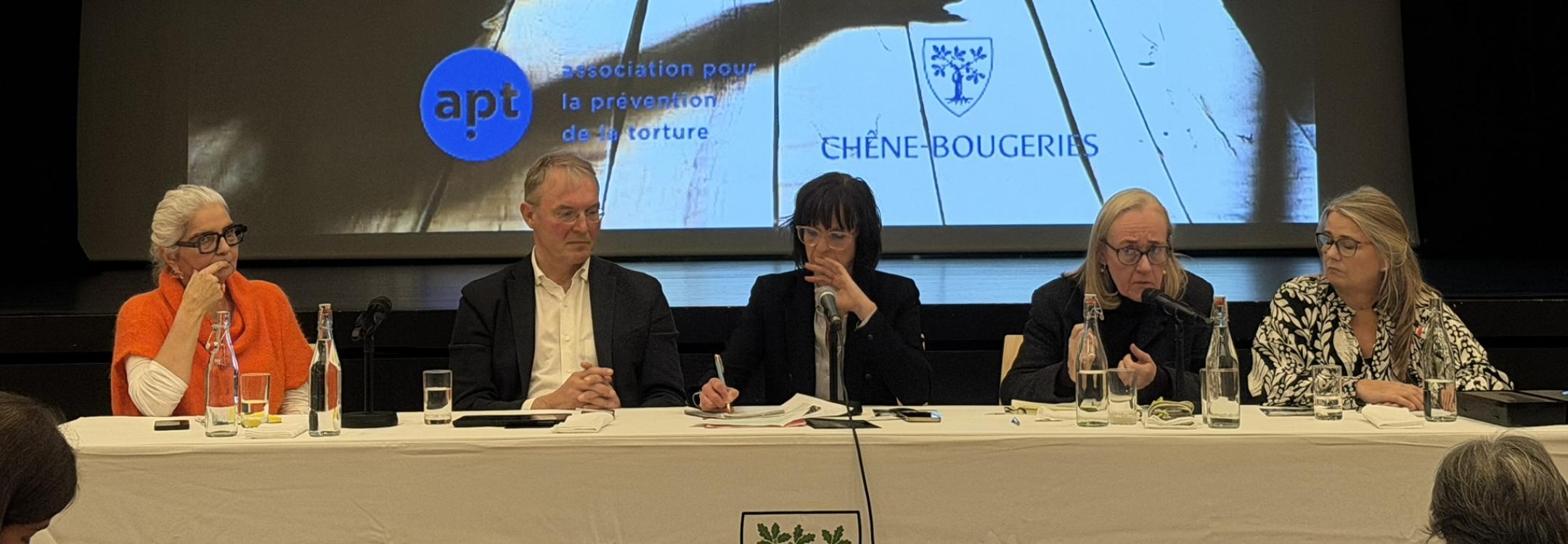
The recent public dialogue in Chêne-Bougeries on mental health and deprivation of liberty brought forward powerful reflections from health practitioners, oversight bodies, civil society and people with lived experience. Across all perspectives, it stood out that deprivation of liberty should not be the default response for persons with mental health conditions and, if deprivation of liberty is unavoidable, effective safeguards, adequate healthcare and multidisciplinary support must be ensured.
Recognising the profound impact of deprivation of liberty on people’s mental health
The discussion highlighted a core dilemma: do people with higher rates of mental health conditions end up in prison because the difficulties they experience make it harder to function in society, or is it the prison environment itself – harsh, isolating, and disconnected from loved ones and familiar surroundings – that harms anyone who is placed there? And to what extent does this environment contribute to the worsening of mental health?
Findings from the visits conducted by the National Commission for the Prevention of Torture of Switzerland (CNPT) to different places of detention show that persons deprived of liberty have high rates of mental health conditions. “As pre-trial detention facilities are often overcrowded, this increases the risk of violence as well as the risk of psychological harm to detainees. As a result, the prevalence of mental health conditions is quite high, reaching up to 80%”, said Ms. Corinne Devaud Cornaz, Vice-President of the CNPT. Access to appropriate psychiatric care is frequently limited, and staff shortages – especially of psychiatrists, psychologists, and psychiatric nurses – pose additional challenges.
“The prison environment is metal, noise, violence. It is lack of trust, lack of reference points, rupture, the unknown, because one does not know how long they will have to stay and does not know the people there. It is also a break from work, not to mention all the stigma that affects children, family, etc. And all of this is worsened by overcrowding: when there is overcrowding, there is even less space, and more violence. Women in prison experience particularly high rates of mental health conditions”, stressed Prof. Hans Wolff, head of the Division of Prison Health at the Geneva University Hospitals.
Medical screening upon admission to the place of detention is a key step to address mental health conditions. Within 24 hours of arrival and then regularly during their incarceration, people deprived of liberty should be assessed by trained healthcare staff, including for mental health conditions, drug and substance use, risk of self-harm and suicide.
Other measures recommended by the CNPT include reducing overcrowding, ensuring timely access to specialised psychiatric care, stopping the use of isolation, and improving staffing and training of healthcare personnel.
Karen Hafsett Nye, Coordinator of the Association L’ÉCART, stressed the double stigmatization suffered by persons deprived of liberty and their families, both for the mental health conditions and for being in prison. She also highlighted the lasting impact that confinement has on self-worth, trust and social reintegration. For many years, the Association L’ÉCART, formerly Action Maladie Psychique et Prison du Graap, has been defending the rights of people placed under institutional therapeutic measures governed by Article 59 of the Swiss Criminal Code, as well as supporting their families. Due to a shortage of specialised facilities, these measures are carried out mostly within the prison system. Because improvement of mental health is the decisive criterion for lifting the measure, patients are often kept in detention beyond the length of their sentence.
Reaffirming the key role of people with lived experience of detention and their families
Persons who have experienced deprivation of liberty hold essential insights into what helps, what harms, and what needs to change. The need for better engagement with and support to families also emerged clearly. “Families feel a sense of injustice because their loved one, who is ill and needs care, ends up in a small cell, locked up 23 hours a day, essentially without any treatment”, added Ms. Hafsett Nye. Strengthening communication and building trust with families was presented as a necessary step toward more supportive and coherent care pathways.
Changing paradigm, respecting autonomy and dignity through prevention, multidisciplinary support and reintegration
The debate highlighted several recommendations and ways forward to address the mental health needs of persons deprived of liberty. Prof. Wolff stressed the importance of medical screening upon admission to the place of detention. Within 24 hours of arrival and then regularly during their incarceration, people deprived of liberty should be assessed by trained healthcare staff, including for mental health conditions, drug and substance use, risk of self-harm and suicide.
Other measures recommended by the CNPT include reducing overcrowding, ensuring timely access to specialised psychiatric care, stopping the use of isolation, and improving staffing and training of healthcare personnel.
Kiny Mottier, nurse, member of L’ ÉCART and former director of psychiatric institutions, stressed the importance of supporting persons with mental health conditions deprived of liberty in maintaining contact with their families and networks, “connecting them to their positive experiences of the past and accompanying them in their daily actions”. She added that reintegration requires long-term and multi-disciplinary support.
The debate underscored the need to put the rights, dignity, and autonomy of people with mental health conditions – including those deprived of liberty – at the centre of all care and interventions.
About the Jean-Jacques Gautier series of conferences
The 6th Jean-Jacques Gautier Conference took place on November 11, 2025, in Chêne-Bougeries. The event was opened by Florence Lambert, Member of the Executive Council (Administrative Council) of the Municipality of Chêne-Bougeries and Robert Roth, President of the APT. It was moderated by Marie Lequin, Head of Operations of the Association for the Prevention of Torture (APT).
This conference is part of a larger series established by the APT in partnership with the Municipality of Chêne-Bougeries to honour Jean-Jacques Gautier, founder of the APT and a native of Chêne-Bougeries. Since its inception in 2018, the Jean-Jacques Gautier Conference series has provided a space for the local community to engage on issues surrounding deprivation of liberty and human dignity. Each conference explores a distinct theme—past topics include women and youth in prison, the legacy of Gautier’s work, the impact of war on torture, and the impact of solitary confinement —serving as a platform for dialogue among people from diverse backgrounds.
